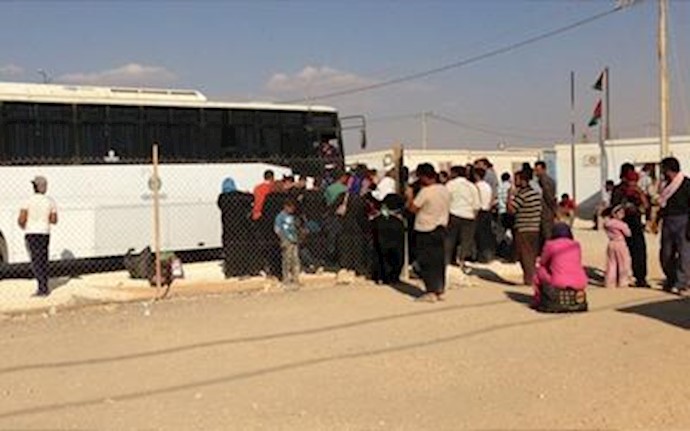BBC, 1 Nov 2012 – The Zaatari camp in northern Jordan was meant to be a place of refuge for 30,000 Syrians. But every day, dozens are choosing to leave the safety of Jordan and make the perilous journey back into the war zone.
The sun is setting on Zaatari as a mother pleads with a soldier to be allowed on to a bus. Around her, dozens of Syrians say their farewells as the engine starts up. While an estimated 360,000 Syrians have fled their homeland, this busload is making the opposite journey.
“We face a slow death here, or a fast death over there,” says Hussain Ayish, pointing towards the border at the other end of the scrubland. As we talk, a low-flying Jordanian military jet and a fleet of helicopters circle overhead.
Truck after truck, most carrying drinking water, files past the Jordanian army tank and along the muddy road at the heart of the camp. Kids chase each vehicle and scrabble to ride up on the back of it.
“Hide your car well,” says Bilal, a police officer. “They have no respect, they will throw stones at you,” he warns. “And make sure you are back before dark.”
This place of refuge has become the setting for an increasingly ugly battle between Syrian refugees and their Jordanian hosts. Demonstrations inside the camp have, on at least one occasion, turned violent, prompting an exodus back into Syria.
Like many of Zaatari’s inhabitants, the Howshan family comes from Deraa, the birthplace of the Syrian revolution, just over the border from here.
I am sitting at the entrance to their tent. The canvas is a dirty yellow, and they have scribbled their name on the outside in marker pen.
They have built a breezeblock barrier around the entrance in a futile attempt to keep the sand out. But it is no use. It gets everywhere – on the grey mattresses that line the edges of the tent, in the blankets, in the water, in the food.
This is my second visit to their temporary home. The mood is a lot more grim than last time.
“Remember my son?” asks Saeed Howshan. “He’s in hospital now, the food, this dirty food,” he says, as his cousin Ali opens one of the brown ration boxes to show me a rotten egg that he claims was this morning’s breakfast.
“No matter what we do, the problems continue,” says Saeed as his nephews sit around him. He is getting animated, performing to an audience. “Even camels do not live on this land. They are treating us worse than animals.”
At this point, a Jordanian charity worker hears the commotion and ducks down, peering into the tent.
“I hope you are not saying anything against the Kingdom, are you?” he asks. The conversation turns into an argument, with the Jordanian accusing the Howshans of lying.
The Jordanian government insists the refugees’ basic needs are met, and claims that supporters of the Syrian regime have infiltrated the camp to cause trouble.
One high-placed official tells me pro-regime shabiha, Syrian paramilitary thugs, militiamen have been planted among the refugees to feed information back to the regime in Damascus.
“If we found one,” Ali says, referring to Syrian agents, “we would kick them out”. But he adamantly denies that the violence was a set up. “We have just had enough,” he says.
The authorities have laid fresh gravel on the main track through the camp. And as we walk along here, dodging the trucks, Ali and his brother Mohsen show me a burnt out portacabin.
“This happened last week,” Ali tells me. “They closed the main road, sent in 300 police and tear-gassed us.”
Ali says it started out as a peaceful demonstration after two days of what he claims was inedible food and a lack of clean water. The United Nations Children’s Fund (Unicef) insists it checks the water twice a day.
There is open hostility on both sides. Police and soldiers patrol the perimeter to make sure no-one gets in and no-one leaves. “We are living in a prison,” Saeed Howshan tells me. “It is like we are prisoners of the Jordanians, it is as if they are working with the Syrian regime.”
Zaatari is essentially an internment camp – built to house Syrians who have crossed the border illegally.
Many of them fled the war zone with the help of the Free Syrian Army and were picked up by the Jordanian forces who have been co-ordinating with the rebels.
When the conflict first broke out, Syrians – who can enter Jordan without a visa – were housed in the cities and cared for by the government. But as the trickle turned into a flood, the Zaatari tent city was erected in the desert and opened in July.
The Jordanian government estimates the country is now home to 200,000 refugees, 15% of them here in the camp.
As night falls over Zaatari, my phone rings, the authorities are telling me that I should have already left the camp. I am at risk, they insist. A small crowd has gathered near the blue toilet block plastered with Unicef logos. They are chanting against Bashar, rather than their Jordanian hosts, tonight.
Ali links arms with me and walks me to the gate where the soldiers are waiting for me. “I am surviving on juice and biscuits,” he says. “Take me out with you.” A soldier orders him back inside.
Like most other refugees I talk to, escape from Zaatari is the only thing on Ali’s mind.
Syrians choose war over Jordan Zaatari refugee camp
RELATED ARTICLES








